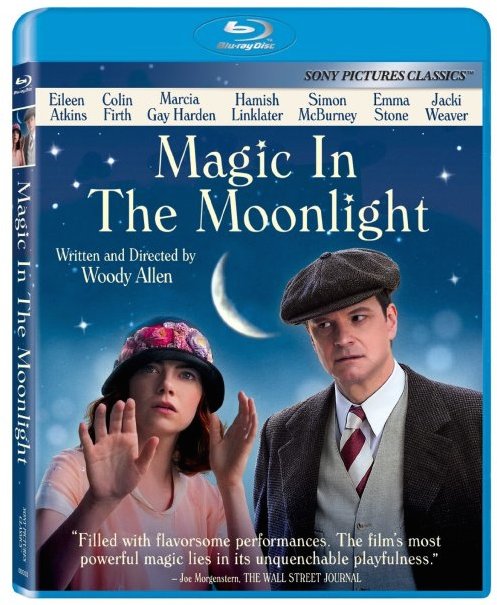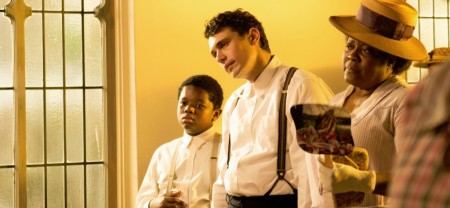As you read this I am en route to L.A. to join Anne Marie & Margaret at the AFI this week so expect coverage of A Most Violent Year and The Gambler premieres, a sneak peek at Selma, a Sophia Loren tribute, and more. But before that all start, and as I fly over some of you, brief thoughts on...
THREE SCREENINGS

THE WAY HE LOOKS
Opens November 7th in limited release
Glenn has already smiled upon this Brazilian coming-of-age film in our ongoing Oscar foreign film race coverage but I wanted to offer my own thumbs way up, too. Like all niche audiences, LGBT people are sometimes too forgiving of bad movies so long as they meet their particular niche needs. But you can love The Way He Looks without any of the guilt that sometimes accompanies pleasure because it's very good.
This affecting high school drama is a love triangle of sorts that plays, smartly, more like a friendship triangle... since all three of its leads are still feeling their way toward their own futures, figuring themselves out. That's particularly true of Leonardo, who is blind and painfully aware that that limits his options. He still dreams of moving out of his parents house and really wants to do a foreign exchange program. His two best friends are Gabriel, a new boy in town who immediately puts him at ease, since he's unphased though sometimes a bit confused about the blindness, and Giovana his best girlfriend since childhood who walks him home every day from school and is so protective that she's become entirely codependent. Giovana resents Gabriel's growing place in Leo's life and nobody ever understands quite what anybody else if feeling. They're all immediately bruised by each other but still walking tightly arm in arm which makes for a hugely sympathetic totally relatable tale of first loves, young friendships and heartbreaks. It's endearing and, like Big Hero 6 (discussed next) it admires the good natures of its characters and their capacity for kindness and love. I don't mind sounding Pollyanna about this: I love seeing basically decent loving people dramatized on film. That seems to be out of fashion in film and television characters so it's a special treat now when you see it, like a unicorn. B+

BIG HERO 6
Opens November 7th
Daring the long long shadow of The Incredibles, one of the best animated films and one of the best superhero films of all time, this initially very charming movie is about a genius robotics nerd named Hiro (voiced by Ryan Potter) whose older supremely good-natured brother Tadashi (voiced by Daniel Henney), also a tech wizard, convinces him to develop his skills at college instead of wasting them on robot fights. Take that Real Steel! Tadashi's best invention is that white inflatable marshmallow like A.I. you've seen in the trailers named Baymax. A fateful series of events, which I won't spoil though I'm betting the trailers I haven't watched already did, changes everything and suddenly Hiro is furiously reconfiguring Baymax with armor and jetpacks and taking him far from his original purpose as an inhome nurse. Hiro teams up with his new college friends (hence the plurality of the title) to fight off a supervillain in a kabuki mask. The second half of the movie is quite a deflation, sadly. You can feel the pandering for all demographics and senses of humor and like so many visual effects movies the climax is just a mess of OVERLONG NOISY ACTION SETPIECE without much character weight, steering this movie towards "fun but predictable/disposable action-comedy".
But, you know, the things it does well are awfully hard to shake. And boy does that initial brotherly bond stick in the heart. The movie is decidedly pro education (nice to see in a movie), the animation is beautiful, and it's nothing short of wonderful to see a blockbuster family movie led, unambiguously, by people of color. They even used Asian actors for the voices. Well done. B
 MAGIC IN THE MOONLIGHT
MAGIC IN THE MOONLIGHT
Coming to DVD/BluRay in December
I had remembered this getting relatively mild reviews, inspiring neither loving nor loathing, so it was a surprise to discover a quite emphatically bad movie dully staring back at me. I didn't buy one single moment of it from Emma Stone's strangely lackluster star turn, to Colin Firth's mannered fussiness to the various relationships and plot "twists". I amend: I didn't buy one single moment of it that didn't involve Eileen Atkins as "Aunt Vanessa" who is the film's sole bright light, totally charming and authentically aunt-like both emotionally involved and appropriately removed from whatever is ailing her incorrigible celebrity nephew's heart and soul. That's really too bad because the core idea of the movie is "fun" if you will and there's a whole slew of good actors standing around with nothing good to play with. What's more the real life magician its riffing on, an Englishman who was globally famous, not as himself but in yellowface as a Chinese illusionist named Wei Ling Soo, is also richly fertile ground for a screenplay. It's easy to imagine a pretty great movie emerging from that historical figure and obviously several pretty great movies have emerged in the romantic comedy genre by pitting competing agendas against each other in the form of a man and a woman for whom falling in love is a gigantic inconvenience. But it doesn't remotely work, the romance especially (Firth & Stone have zero chemistry) and the smothering atmosphere is one of laziness... like no one is trying at all (particularly Stone & Allen) or like they're trying too hard (Colin Firth, Hamish Linklater) sensing the inconsequential piffle around them or like they're standing around wishing someone would ask them to try at all (Marcia Gay Harden). D
 Monday, November 17, 2014 at 9:45AM
Monday, November 17, 2014 at 9:45AM  Michael C. with your weekly new release review...
Michael C. with your weekly new release review...











